The document discusses different types of memory allocation in C programming. It describes implicit and explicit type casting, and the functions used for dynamic memory allocation - malloc(), calloc(), realloc(), and free(). Examples are provided to demonstrate how to allocate and reallocate memory at runtime using these functions. malloc() allocates a single block of memory, calloc() allocates multiple blocks, realloc() changes the size of previously allocated memory, and free() releases the allocated memory.

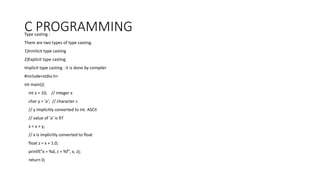
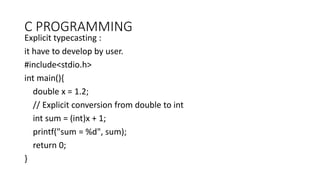
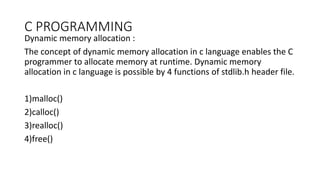
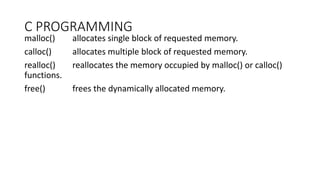

![C PROGRAMMING
// Check if the memory has been successfully
// allocated by malloc or not
if (ptr == NULL) {
printf("Memory not allocated.n");
exit(0);}
else {
// Memory has been successfully allocated
printf("Memory successfully allocated using malloc.n");
// Get the elements of the array
for (i = 0; i < n; ++i) {
ptr[i] = i + 1;}
// Print the elements of the array
printf("The elements of the array are: ");
for (i = 0; i < n; ++i) {
printf("%d, ", ptr[i]); }}
return 0; }](https://image.slidesharecdn.com/dma-220910164744-a7c70249/85/DMA-pptx-7-320.jpg)
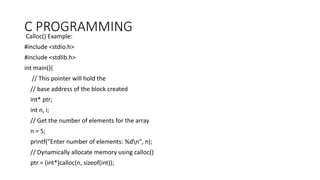
![C PROGRAMMING
// Check if the memory has been successfully
// allocated by calloc or not
if (ptr == NULL) {
printf("Memory not allocated.n");
exit(0);}
else {
// Memory has been successfully allocated
printf("Memory successfully allocated using calloc.n");
// Get the elements of the array
for (i = 0; i < n; ++i) {
ptr[i] = i + 1;}
// Print the elements of the array
printf("The elements of the array are: ");
for (i = 0; i < n; ++i) {
printf("%d, ", ptr[i]);}}
return 0;}](https://image.slidesharecdn.com/dma-220910164744-a7c70249/85/DMA-pptx-9-320.jpg)
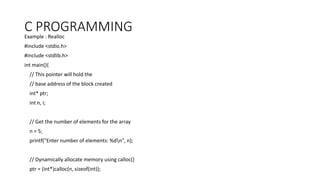
![// Check if the memory has been successfully
// allocated by malloc or not
if (ptr == NULL) {
printf("Memory not allocated.n");
exit(0);}
else {
// Memory has been successfully allocated
printf("Memory successfully allocated using calloc.n");
// Get the elements of the array
for (i = 0; i < n; ++i) {
ptr[i] = i + 1;}
// Print the elements of the array
printf("The elements of the array are: ");
for (i = 0; i < n; ++i) {
printf("%d, ", ptr[i]);}](https://image.slidesharecdn.com/dma-220910164744-a7c70249/85/DMA-pptx-11-320.jpg)
![C PROGRAMMING
// Get the new size for the array
n = 10;
printf("nnEnter the new size of the array: %dn", n);
// Dynamically re-allocate memory using realloc()
ptr = realloc(ptr, n * sizeof(int));
// Memory has been successfully allocated
printf("Memory successfully re-allocated using realloc.n");
// Get the new elements of the array
for (i = 5; i < n; ++i) {
ptr[i] = i + 1;
}](https://image.slidesharecdn.com/dma-220910164744-a7c70249/85/DMA-pptx-12-320.jpg)
![C PROGRAMMING
// Print the elements of the array
printf("The elements of the array are: ");
for (i = 0; i < n; ++i) {
printf("%d, ", ptr[i]);
}
free(ptr);
}
return 0;
}](https://image.slidesharecdn.com/dma-220910164744-a7c70249/85/DMA-pptx-13-320.jpg)